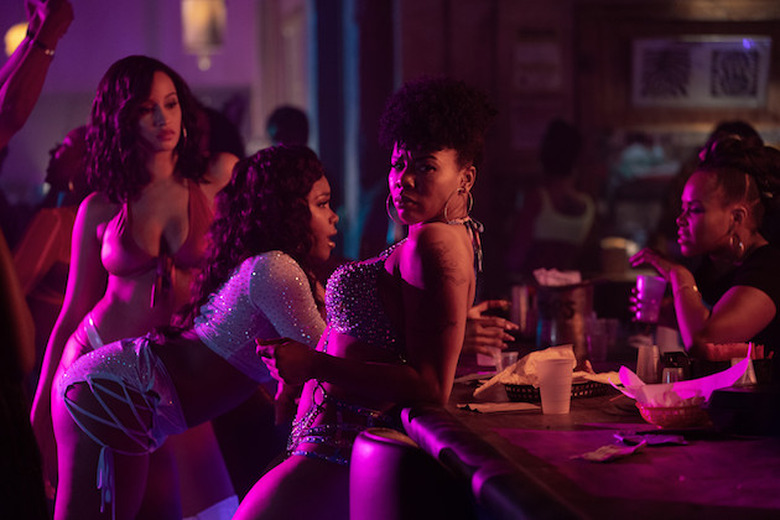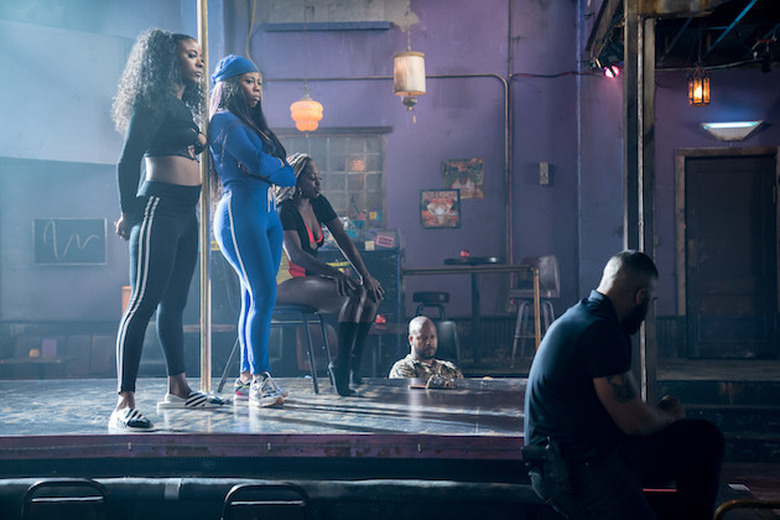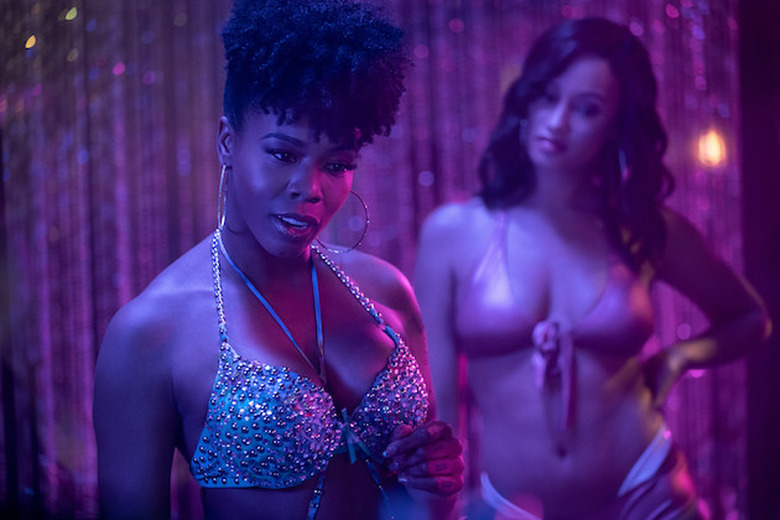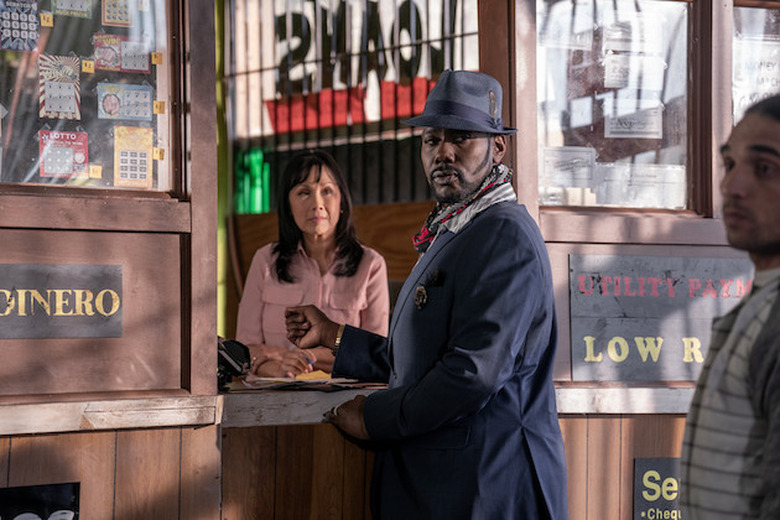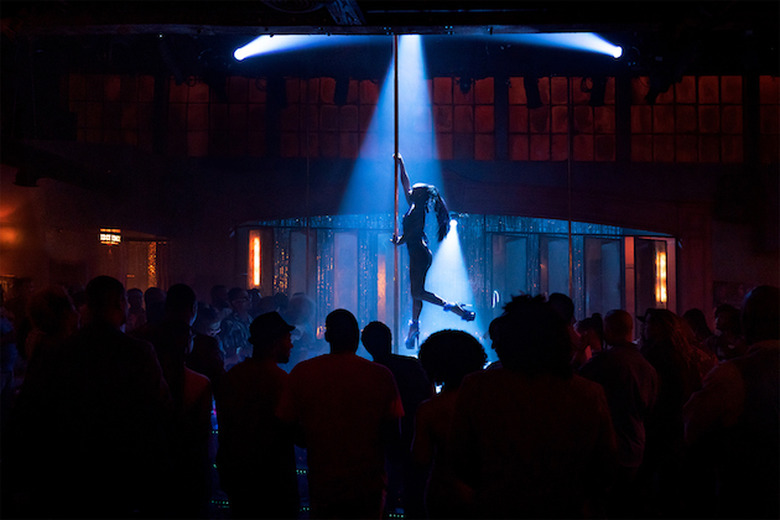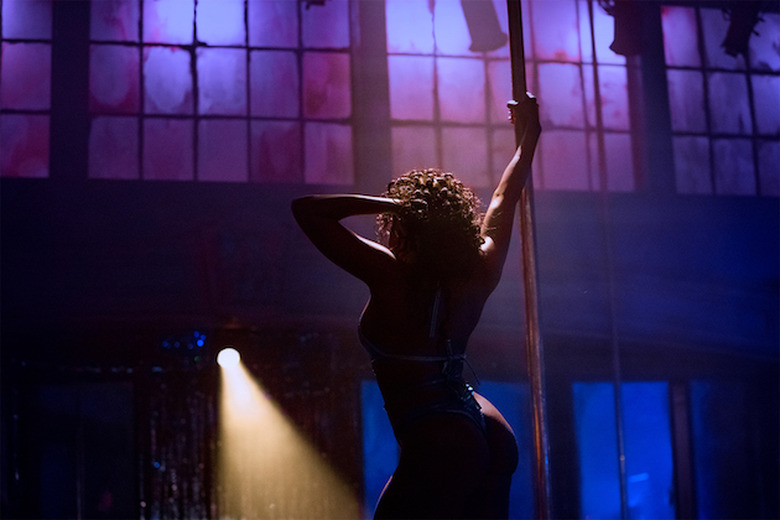P-Valley: 5 Things To Know About Starz's 'Delta Noir' Strip-Club Drama
Pop culture is more than happy to show audience exotic dancers on stage, performing athletic feats for dollar-dropping dudes. But Katori Hall, whose P-Valley premieres Sunday (9/8c) on Starz, says she wanted to explore what happens way beyond last call and the house lights coming up.
"What [exotic dancers] do, it's hard work," the series creator and executive producer tells TVLine, recalling when she took a pole-fitness class and realized just how much core strength was necessary to do even the most basic moves. "I think I'm going to twerk a little and then climb up on the pole," she says, laughing. "I could twerk a little, but I couldn't climb up on that pole!"
The experience was one step along the path that would eventually bring Hall to write P—y Valley, the play on which P-Valley is based. "What [dancers] do should be respected," she adds. "And for me, that not being able to do what they could do was my entry point into the story."
The hour-long drama introduces viewers to "delta noir," a term Hall coined to describe the sultry, secretive world of The Pynk — a Southern strip club run by a gender non-conforming owner named Uncle Clifford — and its denizens.
"There aren't that many black women in noir. There's definitely no Uncle Cliffords in noir," she explains. "So I feel as though our show is breaking open that genre and placing people who just don't exist within it. And then, in terms of the delta-ness of it, the show has a certain rhythm: We move like molasses. We take our time when we say our words and when we move through the club, and there's this amazing sense of humor that's diffused through every episode."
In addition, the EP points out, P-Valley depicts its female characters as fully realized people and not just G-string models.
"Women have had to deal with a long history of hyper-sexualized images of them, Black women especially, and so we talked a lot about how we were always going to place the camera so that we are experiencing what the women are going through and not necessarily [just] looking at their bodies," Hall continues.
"The strip club is a complicated place," she adds. "There's this interesting tension between exploitation and liberation, and the show really delves into that."
Ahead of P-Valley's debut — and with the help of Hall and series star Brandee Evans — we've pulled together a few Things You Should Know about the series. Scroll down to get all the delta dirt.
5. SHE WORKS HARD FOR THE MONEY
After Hall's harder-than-it-seemed pole-dancing class, she delved into an investigation that would inform her play (and later, P-Valley). "I ended up doing a ton of research going to clubs, interviewing women, because I respected what they did," she says. "I heard many heartbreaking stories. I heard many inspiring stories."
4. 'I WAS LIKE, 'BOOM, BANG''
Evans (The Bobby Brown Story) plays Mercedes, The Pynk queen bee who in the premiere gives newcomer Autumn Night (played by Elarica Johnson, A Discovery of Witches) a bruising introduction to life at the club. "Oh, I knew who Mercedes was from the first line, when Mercedes has her first thing to say, because that sounds like my homegirl back in Memphis," the actress says. "I was like, 'Boom, bang. Mercedes is from Memphis. I've got this.'"
3. ORGANIZATIONAL KNOWLEDGE
Nicco Annan (Claws), who plays The Pynk proprietor Uncle Clifford, "has been reading this story since it was five pages long," Hall jokes. "That's how long our collaboration goes back, to the point that I don't think Uncle Clifford would be Uncle Clifford without Nicco having started in the trenches with me when we were doing readings of it in my living room in Hell's Kitchen, you know?" Annan originated the role when P—y Valley was staged at Mixed Blood Theatre in Minneapolis in 2015; "He's one of my dearest friends," Hall adds, "so I must say I feel so blessed to have had him from literally you know, the first page of the project."
2. QUICK LEARNER
To help Evans learn Mercedes' moves, the series' choreography team brought in a pole-dancing legend known as Spyda. "Spyda taught me the 'hood way, like she probably learned," Evans says, laughing. "She was like, 'Girl, watch me.' And I'd be like, 'OK.' And luckily, I'm a visual learner... So, she taught me the old school, hard way of 'Pay attention, or bust your head open.'" Evans laughs harder. "I was like, 'OK. I got you.'"
1. WALK THIS WAY, TALK THIS WAY
The show is steeped in African-American Vernacular English, a dialect that Hall says was integral in creating a realistic world for her characters. "I really wanted to showcase my Southern roots and also showcase my Blackness," Hall says. "I grew up listening to my grandmother speak in this way, and I just feel it's so beautiful. I feel like it's a way to preserve our culture... It's a way for us to embrace and show that we love who we are and where we come from. I feel like that's the most Blackest thing I can do, right about now, is to be like, 'No, we speak a certain way. We move a certain way. And that's a valid form of communication, and you just going to have to learn our language if you want to be in our world!'"
